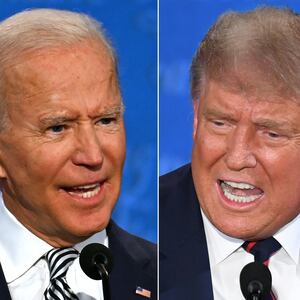Despite the fact that nearly everyone agrees that the first presidential debate was a disaster, Joe Biden still managed to come out of the night with a catchphrase. As Donald Trump spoke over him, Biden snapped, “Will you shut up, man?”
It was both a retort and a plea. Now, it’s a T-shirt.
In what felt like no time at all, the former vice president’s campaign mocked up a $30 top, slapping a petulant portrait of Trump over charcoal gray with white lettering spelling out the new slogan. It sold out quickly, but countless other imitators emerged. (A Biden campaign spokesperson was not available to comment.)
ADVERTISEMENT
Phenomenal Woman, a social justice organization founded by Kamala Harris’ niece Meena, put the question on a neon-orange sweatshirt, writing it in flamingo pink script as if it were a Miami Vice tagline. On Etsy, the phrase found itself blazed over tops, mugs, and wine glasses.
After news broke early Friday morning that the president and first lady contracted coronavirus, raising questions about Trump’s ability to keep campaigning, “Will you shut up, man?” gained a new, darker connotation. But even before the bombshell, the comeback might have lost some of its zing.
According to Google Trends, search queries for the phrase peaked at 11 p.m. on the night of the debate, and fell since then. (Shoppers in Washington, D.C, Vermont, and Oregon were the ones looking it up the most.)
T-shirt sellers say the fleeting popularity worked well for them. One, a 22-year-old Texas A&M economics student named Tarik Yilmaz, runs an Etsy shop out of his parents home in Houston. He began the store, Zuzuu Tees, as a quarantine project.
In two months, he sold about 850 tops, mostly politically themed with graphics that read “Kamala” in script or “Climate Change is Real.” The day after the debate, he sold a hundred “Will you shut up, man?” shirts.
“I’m doing good business out of that design,” he said. “I saw that the Joe Biden campaign is also selling these, and I’m really upset about it.” (Yilmaz added he supports the Biden/Harris ticket.)
“My parents thought I’d spent too much money getting into this business, but after yesterday I think they support me,” he said. “They think I’m really good at this.”
Yilmaz says interest in campaign merch works like the seasons. “It’s October, so you sell Halloween shirts,” he explained. “After that, it’s Christmas, so you sell Christmas T-shirts. Now, you have to sell political T-shirts. In order to make money, you have to follow what people are buying.”
John Brown, 47, lives in Phoenix, Arizona and runs Sinking Ship Tees, another Etsy store front with “shut up man” merch. “When I heard him say it, I thought, ‘That’s a T-shirt,’” Brown said.
During the second Bush administration, Brown ran a coffee shop in Austin, Texas. His business partner made bumper stickers blazoned with a crossed-out “W.” “We would sell 100 of those a day in the shop,” Brown remembered. “There’s always going to be a demand for political gear. Make America Great Again stuff sold like crazy for the last four years.”
Trump’s former campaign manager Brad Parscale said in 2019 that nearly a million red MAGA hats have been sold, which amounts to about $45 million in donations. Ace Specialties Inc, a promotional products company based in Lafayette, Louisiana, makes the caps and all official Trump merchandise. In 2017, Bloomberg reported that Ace had earned more than $21 million from the campaign for that work.
Trump has made a career off of sticking his name on things; there was no question he would expertly market his campaign. MAGA hats were the first instantly recognizable political merch, and Democrats struggled to offer their own ubiquitous goods.
“Nasty Women” became a rallying cry for Hillary Clinton supporters. Biden has countered his milquetoast image by turning his campaign store into an anti-Trump emporium. You can buy shirts that say, “I Pay More in Taxes than Donald Trump” and “We Choose Science Over Fiction.”
If Biden wins (and Trump recognizes it), do these tops become obsolete? Are these tops destined for a landfill, another example of over the top American consumerism?
Sure, says environmental toxicologist and sustainable fashion expert Linda Greer, but keep things in perspective.
“It must be said that if this [shirt] helps elect a president who believes in climate change, then it will undoubtedly cover the impact of buying the shirt,” Greer said. “When I think about fast fashion, I think about people buying lots of clothing that they don’t need for stupid reasons. In this case, they’re buying a piece of clothing they don’t need for a good reason, so it sits differently in my own mind.”
Not all political merch is transient. Greer still owns her Reagan-era “Ed Meese is a Pig” T-shirt. “I have it for things like a Halloween party; you never know when you need to pull it out. You shouldn’t assume that all of these shirts go into the trash,” she explained.
Charcy Evers, a retail trend analyst based in New York, says the phenomenon is similar to Super Bowl apparel, made before the game for both sides. “They are ready to crank out merch for whichever team wins,” she said. “They know it’s only a matter of time before another foot in the mouth moment and they want to capitalize it on it.”
Evers is not so sure “shut up man” will become a 2020 rallying cry. “I don’t think many people will want to wear a tee that has ‘shut up’ on it,” she said. “It’s still an abrasive word to me—it’s what you say when you are at your wits end. But then again we all are, so perhaps that’s the tipping point.”
Allison White, a 32-year-old from Austin who works for the IRS, might buy the “I Pay More in Taxes than Donald Trump” shirt, though she does not know where she would wear it. “I’m really cautious about buying merch,” she said. “It feels like a jinx.”
White wanted one of the Team Biden store’s “shut up man” tops, but for one design flaw: the president’s mug. “I don’t want to look at his face if I don’t have to,” she said.





